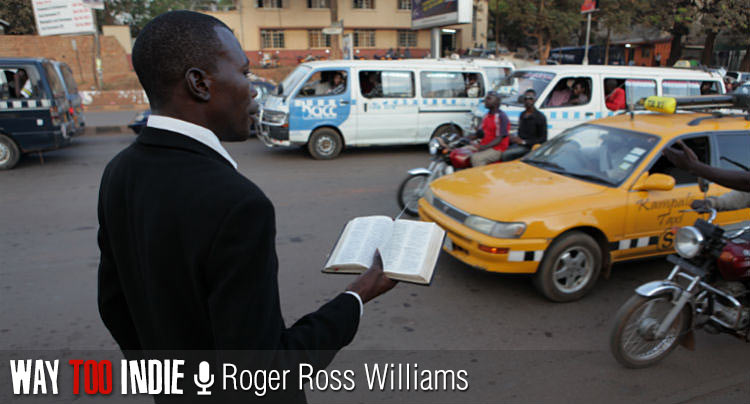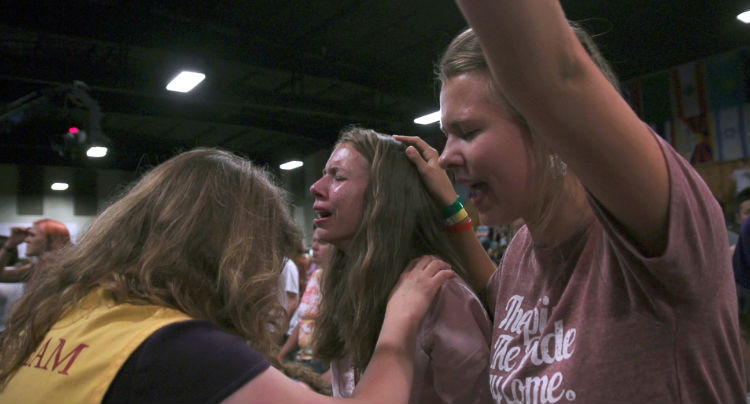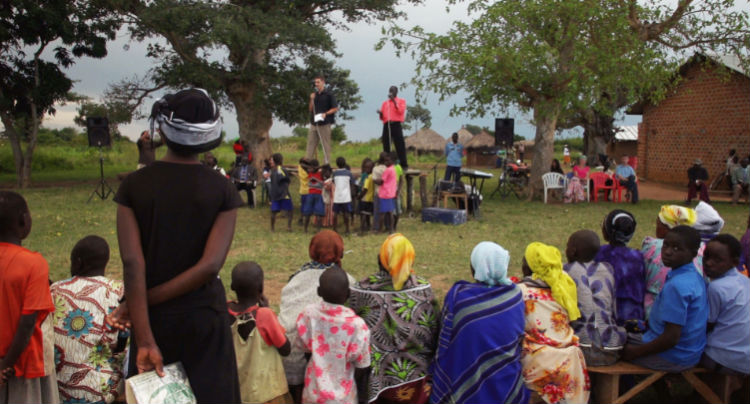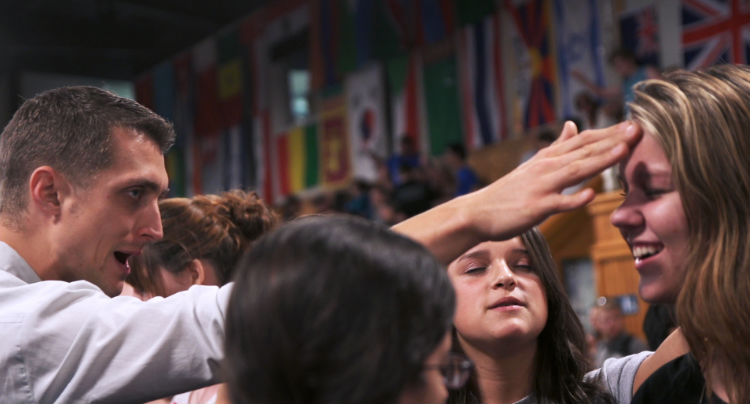Roger Ross Williams on ‘God Loves Uganda’ and the Anti-Homosexuality Bill

Roger Ross Williams’ deeply disturbing, eye-opening documentary, God Loves Uganda, explores the role White, evangelical Americans played in spreading anti-gay sentiment across the African country, which led–frighteningly–to Ugandan parliament proposing the Anti-homosexuality bill, which criminalizes homosexual relations and actions and deems them punishable by death.
Supporters of the LGBT community in Uganda, like Bishop Christopher Senyonjo (one of the subjects of the film), are few and far between. As visiting missionaries from American organizations like the International House of Prayer continue to propagate their anti-gay ideals, Uganda grows more and more desperate for a radical change in national morality. Williams’ terrific documentary will hopefully be a catalyst for discussion on the issue and lead to a brighter future for Uganda’s LGBT community.
God Loves Uganda is playing now in select cities
Now that the film is done, how has the festival circuit been treating you? What’s the reception been like?
The buzz at Sundance was phenomenal. Something amazing happened. A group of evangelical seminary students come every year to Sundance, and they invite certain films that have an issue of faith to come have a panel and discussion in a church basement in Park City. We were terrified to go, but it ended up being really powerful. We realized that the film had the potential to have this dialog with the evangelical community that we didn’t even realize when we started.
That’s interesting. You never intended for that?
I did, but I thought it would be more with moderates and progressives, not the sort of fundamentalist, conservative evangelicals. I knew that from spending so much time with the International House of Prayer. They were so closed off to non-Christian press. But, the event at Sundance was run by Fuller Seminary, which is in Pasadena, California. It’s the largest evangelical seminary in the world. The panel was really emotional and powerful. Bishop Christopher Senyonjo, who’s in my film, was with me, so it was great. A mother stood up and said she had a gay daughter. She rejecter her daughter, then she went to the church and the church rejected both of them, and she accepted her daughter’s sexuality. She said she started her own group of evangelical parents with gay kids and said it was liberating and started crying. It was very emotional.

The process of promoting a film for a documentarian like yourself is crucial, since you deal with real world issues and have essentially become an activist.
It’s hard to say which is more intense; the process of making the film or the process of this engagement, which is so important. I knew the engagement was so important going into this, so I said I would commit myself to one year of being engaged with this issue. I’m not an activist–I call myself an “accidental activist”. I all of a sudden became an expert on this issue and people wanted to hear from me. I realized that film has such an incredible power to change.
Recently, I was on Al Jazeera with the former Vice President of Uganda, Dr. Gilbert Bukenya who is currently a member of parliament and is running for President of Uganda. He could likely be the next President of Uganda. We had this incredible dialogue. I traveled to Washingto D.C., and we screened the film. His daughter and assistant came to the screening, and afterwards said, “Wow, this film totally opened our eyes. This is exactly what’s going on in our country.” She later told me her father wanted to meet with me. Dr. Bukenya had been in support of the Anti-homosexuality bill. I ended up in this hotel room with the possible future president of Uganda!
What were you thinking as you sat there?
I was thinking, “This is crazy!” How am I now in this position where I can make a difference in people’s lives? I was thinking, don’t let this moment go. I convinced him to come out with a statement in support of the decriminalization of homosexuality in Uganda. I got him to work with me to do a series of video spots supporting LGBT equality, and he would also like to screen the film in Uganda. He says people his age are kind of stuck in their ways and won’t see the film, but young people will. He realized Africa had to change in the same way America had to change 30-40 years ago. They’re in that place, and they have to respect the rights of everyone. He said he’d like to do it through my film.
You struck a goldmine there, didn’t you?!
I struck a goldmine! I’m going to send a crew to Uganda to film a video spot of him.
Why don’t you go yourself?
I just think I’m so high-profile over there. There are amazing activists who are very high-profile who live in Uganda and are fine, but…[trails off.] I asked if we could do a screening in Parliament. He said, if we did a screening in Parliament, I’d have to be gone by the time the credits rolled. I’d have to be on a plane, like in Last King of Scotland. I know the passion and anger of these powerful pastors. I sat there and spent time with them as they said they were going to form militias, go door-to-door, and hunt down gay people and kill them themselves because the government isn’t moving fast enough.

The most shocking and appalling piece of footage in the film is when parliament first reads the Anti-homosexuality bill and they all start cheering madly. My jaw dropped.
That was a scene that didn’t even seem real. They’re banging on their desks, screaming “My bill! My bill!” I think the homosexual has become a scapegoat for all the other problems–and there are a lot of them–going on in Uganda. They demonize something and put all their anger into it, and I see it a lot. If you go up to a common Ugandan and say, “What do you think about homosexuals?”, they’ll say, “I hate them.”
We just did a tour of Africa with the film. We started in Nigeria, where a bill was just passed by parliament. The LGBT community in Nigeria is just terrified. We were in Malawi, and we had a debate after the screening. We invited faith leaders and people from the LGBT community, who were all in the closet, because you can’t be out in Malawi. The room was split down the middle, half gays, half faith leaders. The pastors were so angry, screaming Sodom and Gomorrah.
A woman came down in front of everyone and said, “I’m married and have two children. I love my children, but I don’t love my husband. Do you know why? My marriage is a lie. You guys force me to live a lie, because I’m a lesbian and you’ve forced me to marry a man. I love my girlfriend.” Then, her girlfriend came down out of the audience and they kissed.
Wow.
The LGBT side started cheering! Then, there was a line. Everyone wanted to come out in public. It was the first time anyone had come out in public. We were on the front page of all the newspapers!
Bishop Sonyonjo is the hero of the film, and of Uganda, as far as I’m concerned. Are you close with him?
He comes with me to a lot of screenings. He gets standing ovations, as you can imagine. He’s a hero. He was living in poverty because he lost his pension after taking his stance. He didn’t have to take that stance. He had run the church of Western Uganda for 25 years and is married with ten kids. He said, “People don’t understand homosexuality, and I have to educate people.” People would say, “How could you give up everything for this cause?” He said he believed this was what God was telling him to do. The Elton John Aids Foundation came to his rescue and gave him a grant, and he was able to start St. Paul’s Center for Reconciliation, which is the only church where LGBT people can go and pray.
Uganda is the youngest population on the planet, with the median age being 15. After Idi Amin, Uganda was devastated because of HIV/AIDS and civil war. The parents were all killed. The evangelicals saw a vacuum and filled that vacuum. The founder of IHOP told me that he was there the day Idi Amin fell in 1979 with a group of evangelical leaders from America. He said he was on the ground, bullets flying over his head, there to take the country as a Christian nation. They went in there right at the beginning and said, “This is our chance to take an African country and rebuild it in our own image.”

Talk about the misconception amongst Ugandans that homosexuality is an import from America, which is obviously false. Where did that come from?
There are a number of talking points that Americans have well-planted in the minds of pastors who call themselves anti-gay activists. One of the talking points is that there are no gay Ugandans, and that homosexuality is a choice, from the West. Scott Lively, in his presentation to the Ugandan government, spelled out talking points. “Here’s what you say: This is our native culture…” which isn’t true. The king of Buganda at the turn of the 20th century was an openly gay, accepted king. Another talking point was: “It’s the homosexuals’ goal to recruit your children.” By saying that, he’s saying, “This is a threat. Their goal is to wipe out mankind.” Why would anyone want to wipe out mankind? He said, “They’re the ones responsible for the Holocaust and the Nazi movement.”
It’s so absurd…
It’s totally absurd!
How long was the filming process?
It was over 3 years. I’d go for six weeks, then three to four. I was totally immersed.
Did it mess with you?
Totally. Oh, totally. It’s so bizarre. I don’t even know how I did it, looking back. I don’t know how I did it. I was on some sort of mission, or I was driven. I don’t know. There was a point where I was outed. Someone sent an email. One of the missionaries who lived in Uganda wrote a blog about me following her. The email said I was part of the gay agenda and that I should be…[trails off.] She sent it to all the anti-gay pastors in Uganda.
All of them?
All of them. It went around to everyone. She wouldn’t talk to me for a long time. I finally got her to answer the phone, and I asked if we could meet for lunch. She said okay. She brought a book. She said, “This is a book about a friend of mine who survived homosexuality. I want you to read this book. He’s a friend of mine from IHOP. You can survive this sexual brokenness that you’re going through, because I’ve survived it. I was attracted to women, and that’s why I fight so hard against this evil.”
She’s in the film!
Yeah. That’s how I found her! I was like, “Yes!” I thought she’d never say that stuff on camera. She prayed for me in the middle of the restaurant and then said, “Would you like to continue filming me?” I said, “If you really believe people can be cured of homosexuality, you need to say that on camera.”
Is there progress being made in Uganda right now?
With Dr. Bukenya onboard, we can actually make some real change in Africa. We need African leaders who are reasonable to stand up against hatred. I think there’s a lot happening on the ground. Activists are doing a great job out there. They have great support from the international community, but it has to come from Ugandans and faith leaders, because faith is the reason this bill exists.
